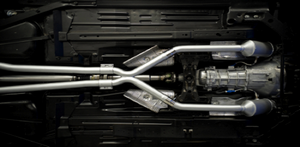|
By accessing or using The Crittenden Automotive Library™/CarsAndRacingStuff.com, you signify your agreement with the Terms of Use on our Legal Information page. Our Privacy Policy is also available there. |

Aluminized Steel VS Stainless Steel Exhaust Systems - Pros and Cons
|
|---|
|
|
Aluminized Steel VS Stainless Steel Exhaust Systems - Pros and Cons
Jason Lancaster
April 6, 2012
When choosing an exhaust system for your vehicle, you may have trouble choosing between a stainless steel exhaust system and an aluminized steel exhaust system. In general, aluminized steel costs less, but both systems have advantages and disadvantages. It's important to consider your needs and especially your location before you make your decision.
Appearance
If the appearance of your exhaust system is important to you, stainless steel has a definite advantage. Stainless steel can be polished, so it will look newer longer compared to aluminized steel. Don't let the name fool you, though. Stainless steel is not actually stain proof. Over time, stainless steel may develop discoloration, especially because exhaust systems reach very high temperatures. Blueing is common, in fact, on stainless steel parts used on vehicle exhaust systems.
Of course, the location of the exhaust system can make it challenging to keep stainless steel polished. Unless you are dedicated to constant cleaning and polishing, stainless steel might not be worth the extra expense...at least as far as looks are concerned.
Corrosion Resistance
When it comes to resisting corrosion, however, stainless steel is the way to go. If you live in a dry climate that stays fairly warm in the winters, aluminized steel will be good enough for your car. However, if you live in an area near salt water or an area that receives a lot of snowfall and uses salt on the roadways, you should probably consider stainless steel. Because of stainless steel's high corrosion resistance, it's also easier to provide a warranty on a stainless steel exhaust system.
Stainless steel comes in different grades with different levels of resistance. If corrosion and pitting are a major concern, look at 304-grade stainless steel, also known as marine grade. An exhaust system made from 304-grade stainless steel can actually last about 20 years.
Lifespan
A quality stainless steel exhaust system might outlast your car (indeed, some exhaust manufacturers warranty stainless systems for 1,000,000 miles). Only you can determine how long you plan to own your vehicle. If you are looking for replacement parts on a vehicle you are likely to sell in the next five years, an aluminized steel part makes more sense. It costs less, and you don't need to worry about lengthy durability.
Stainless steel is sometimes more brittle than aluminized steel. This might lead to cracking, although this is not a common occurrence.
Density
Stainless steel is denser than aluminized steel, which could be seen as an advantage. However, the tubing in exhaust systems made from aluminized steel is typically thicker, which tends to offset any strength or weight advantage the denser stainless steel might have.
When it is time to consider a new exhaust taking all these factors into account will really help you make a wise decision.
Author Jason Lancaster is the editor of ExhaustVideos.com,
a website dedicated to answering all your important exhaust questions, including the stainless steel vs aluminized steel exhaust question.


















